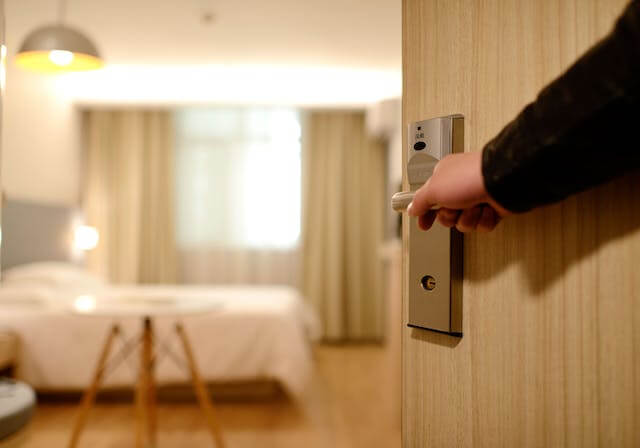Opening a hotel is an exciting venture, but it comes with its own set of challenges, particularly in ensuring the safety and security of both guests and staff. From securing the premises to training your team and preparing for emergencies, there are several key measures to consider. In this guide, we’ll explore six essential ways to keep yourself protected when embarking on the journey of opening a hotel. By implementing these strategies, you can create a safe and secure environment for everyone involved, setting the foundation for a thriving hospitality business.
Table of Contents
Secure Your Premises:
Make sure all of your building’s entrance points, such as windows and doors, have strong locks that are routinely checked for weaknesses in order to secure your property. Invest in security cameras and lighting to deter intruders, providing added surveillance and visibility during both day and night. Regular patrols of the perimeter can help identify any potential weak spots that need addressing promptly. To strengthen security protocols even further and notify you of any suspicious behavior, think about adding motion sensor lights. Implementing a visitor management system can help track who enters and exits your premises, adding an extra layer of security. Additionally, maintaining clear lines of sight throughout your property can help deter criminal activity and ensure a safer environment for both guests and staff.
Train Your Staff:
Make sure your employees are prepared to handle any circumstance by providing them with thorough training on emergency protocols and security measures. Emphasize the importance of vigilance and prompt reporting of any suspicious activity to maintain a safe environment for guests and colleagues alike. Frequent simulations and drills can assist them reinforce their training and speed up their reaction speeds in a variety of situations. Promote open communication among employees to develop a team-based approach to security and issue resolution. Providing ongoing support and resources for staff training demonstrates your commitment to their safety and the security of the hotel premises.
Put Access Control Measures in Place:
Make sure that only people with permission can enter guest rooms and restricted areas by using key card access systems. Keep a close eye on the distribution and use of keys to spot any irregularities or possible security breaches. Restrict access to private spaces like storage rooms and administrative offices to only those who are authorized. Consider implementing biometric access control systems for added security, utilizing unique biological traits such as fingerprints or retinal scans for verification. Review and update access control policies on a regular basis to minimize risks and adjust to evolving security requirements. Maintaining strict access control measures helps safeguard both guest privacy and valuable hotel assets.
Maintain Guest Confidentiality:
Encrypt critical information, such as financial and personal data, to guard against illegal access and ensure visitor privacy. Limit access to guest information to authorized personnel only and provide thorough training to staff on handling guest data discreetly and securely. Review and update security procedures on a regular basis to avoid potential data breaches and to remain in compliance with changing privacy laws. Utilize secure storage methods for guest records and ensure that electronic systems are protected with strong passwords and authentication measures. By prioritizing guest confidentiality, you can build trust and loyalty among your guests while also protecting your hotel’s reputation and integrity.
Collaborate with Local Authorities:
Foster open communication channels with law enforcement agencies and emergency services to exchange information and coordinate efforts. Share details about your hotel’s security measures and emergency response plans to facilitate a coordinated response in case of incidents. Participate in neighborhood watch or crime prevention programs to stay up to date on local trends and security issues. Work together with local authorities to address any security concerns or challenges specific to your hotel’s location, such as increased crime rates or natural disaster risks. Building a strong partnership with local authorities enhances overall safety and security for both guests and staff, creating a safer environment for everyone involved.
Stay Prepared for Emergencies:
Provide staff with clear instructions on handling various emergencies, including fires, medical incidents, and natural disasters, through comprehensive training and regular drills. Work together with emergency services and municipal authorities to provide a coordinated reaction in case of an emergency. Review your emergency protocols on a regular basis to find areas for improvement and implement the necessary changes. Additionally, consider obtaining hotel insurance to mitigate financial risks associated with unforeseen events, providing coverage for property damage, liability claims, and business interruption. You can efficiently handle situations and guarantee the security and well-being of both visitors and employees by being proactive and well-prepared.
Conclusion
By securing your premises, training your staff, implementing access control measures, maintaining guest confidentiality, collaborating with local authorities, and staying prepared for emergencies, you can create a safe and welcoming environment for all. Remember, investing in these protective measures not only safeguards your property and assets but also builds trust and confidence among your guests, ultimately leading to a more prosperous hotel operation.














